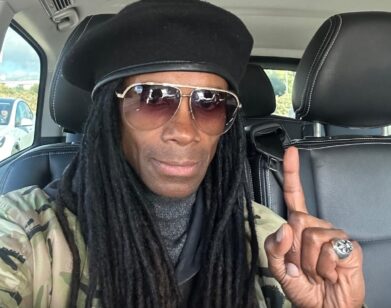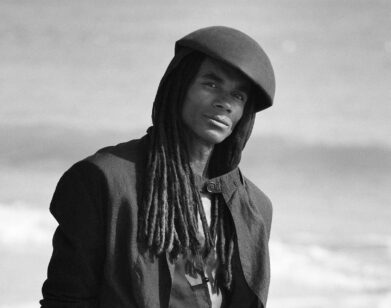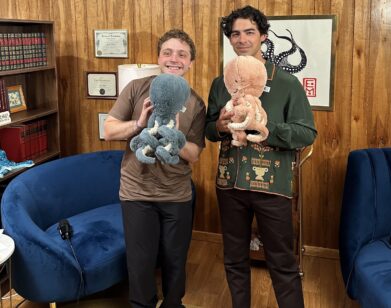Hot for Teacher

Image courtesy of La Société Expéditionnaire.
Leave Ruin, the debut album from the Pennsylvania-based one-man band Strand of Oaks, opens with a nightmare. “I thought I was too old to have dreams like this,” singer-songwriter Timothy Showalter intones. “This is what it feels like to see the world end in flames.” After multiple listens, it becomes clear that the true nightmare is a waking one—Showalter is singing, beautifully, about a messy breakup. (The literal element shouldn’t be ignored either: Showalter’s house really did burn down.)
The rest of the album reflects this first cut: it seems straightforward, but its complexities begin to unfold the third, fourth, and fifth times you hear it. Leave Ruin is perhaps best described as woodsy-appropriate, given Showalter’s choice of stage name. There’s drama in it-well-placed crescendos; a nine-minute love letter-but at heart it’s a man and a guitar in the infinite tradition of men with guitars. Imagine a less dispassionate Damien Jurado, a quieter Neil Young, or a Bon Iver whose lyrics follow a discernible narrative thrust.
Showalter himself is a former Indiana Mennonite who’s now a Hebrew-school teacher in Wilkes-Barre, PA. He drives the school bus for extra money, and leads singalongs with his students on the way to school. We caught up with him after work in the week leading up to his album’s release.
ALEXANDRIA SYMONDS: The bio that your label provides is interesting, but it leaves out a lot of your life story.
TIMOTHY SHOWALTER: [LAUGHS]
AS: It basically says that you were in Indiana, and you were a Mennonite, and that now you’re in Pennsylvania, and you’re a Hebrew-school teacher-without giving any of the in-between. Could you tell me what in your life conspired to make those events occur the way they did?
TS: I moved to Philadelphia when I was a freshman in college, but I guess it boils down to having a girlfriend, and being too young and way more serious than I should have been at that age. Because of that, I was like, “I’m going to move back home to Indiana and marry this girl!”

AS: Did you quit school?
TS: I didn’t quit school; I kept going to college. I was living in Philly and really enjoying it-but I went back home and I went to a really depressing satellite school. So it was kind of a downgrade, but I’m like, “Oh, it’s worth it, I love this girl.” And that went sour really quickly. So in a three-day period, I decided to move to Wilkes-Barre. I had a roommate who was in college who was from there, and I thought, “Oh, I know that guy in Pennsylvania,” without knowing anything about the town. It was like, “I want to leave here, now.” So it was kind of impulsive, but now it’s been six years and I’m still here.
AS: Something must be going right, then.
TS: Oh, yeah. I love it here. I didn’t plan for it to be a long-term thing, but it turned out that way.
AS: How did your teaching job happen? Did you have a religious conversion?
TS: No, not at all. I’m not very religious to begin with. I just needed a job. I graduated with an education degree, and it’s kind of tough to get a public school job. So this one person got me in touch with the school I’m at now. I didn’t really apply; they just kind of hired me, and I’ve been there since. It just happened to be the Orthodox Jewish school. [Laughs]
AS: Do your students know about your other life?
TS: The older ones do. I teach younger kids, around second grade, eight or nine. But our school goes up to eighth grade, and those kids are on the Internet.
AS: Googling you.
TS: Yeah. I think one of the kids a few years ago had an older brother who came to one of my shows, and word spread pretty quickly. The rest of the kids just think, “Wow, our teacher has long hair and a beard, and he’s a little goofy. Who is this guy?”
AS: I was totally going to ask whether you had a beard! I was thinking about whether there were any other teachers-slash-folk singers, and then I remembered that Sam Beam is a teacher.
TS: He’s a college professor!
AS: Yeah.
TS: My beard is camouflaged, though, because some of the rabbis at my school have beards that put mine to absolute shame. They’re incredible beards. Some of them have beards down to their knees. I keep it nice and tidy. But there’s this one holiday called Purim, which is kind of like Halloween. So last Purim, I let my hair down and I wore a robe, because I wanted to look like Moses. But I don’t think enough sometimes, and I realized that I looked a lot like Jesus.
AS: [Laughs] What do you teach, exactly?
TS: Well, I teach second grade, so [I teach] everything that you learned in second grade, all the different subjects. For some reason, this year I also teach computer classes. I don’t know anything about computers.
AS: Well, what are you teaching them?
TS: It’s really basic stuff, but I probably don’t stay on curriculum because I always want to make projects. I want to expand on just learning how to type and the boring stuff that we learned.
AS: What are some of your favorite projects that you’ve done?
TS: Oh! Last year, we did this balloon-car derby, because we were learning about inertia and elementary physics. It was going to be something really small-scale, but then the parents got involved. They got really excited, and they put a lot of time into the cars. So I thought, well, I’ve got to have a proper ceremony for the race. So we set up the whole cafeteria with a racetrack, and the parents were there, and the one boy who ended up winning it is this real quiet kid who comes from a quiet family. But his car ended up going something like fifteen more feet than the others. His dad was jumping up and down with a video camera, and the whole place exploded with applause. I was almost tearing up, like, “This is amazing!”
AS: That’s awesome. So can I move to the album?
TS: Oh, totally.
AS: Two of the songs [“Sister Evangeline” and “Lawns Breed Songs”] both echo this very precise fear-the fear of dying of guilt.
TS: Yeah.
AS: So I was wondering whether Leave Ruin exists for you as a kind of exorcism, whether there’s some element of that in the album.
TS: “Sister Evangeline” wasn’t even meant to be on the record. And after I put it on there, I went back and I was like, “Oh, both of these songs deal with guilt.” And then I started thinking about the rest of the record, and I was like, “Wow, a lot of it deals with guilt. I must be dealing with some guilt issues right now!” A lot of Leave Ruin was about getting over things. And also, the title has two meanings-one is the negative meaning of being left ruined and completely destroyed by something. But the other one is a command: just telling the guilt and the bad times to leave, and to move on from it.
AS: Mm-hmm.
TS: Especially the “Sister Evangeline” song, that is just the saddest for me on that record. I don’t know who that person is that’s in the song, but I think he talks about what I was feeling more than I even thought I was feeling at the time.
AS: Is that an older song?
TS: They’re all sort of the same age, but that song came about really randomly-I feel like I wrote that in a manner of five minutes. And it’s a part of a whole other story, for my next record. I don’t know why it’s on this record. [That record] is about a pope, and a lot of other insane thoughts, and that song kind of fell in that group, but somehow found itself on this current album.
AS: Well, maybe it’ll be a nice bridge between the two.
TS: That’s what I felt like—I could introduce a little a bit of what’s to come, this character. I don’t know. It’s even tough for me to explain what the hell I was thinking. [LAUGHS]
AS: Well, so is the next record—and I hesitate to use the term—a “concept” abum?
TS: It’s a concept only because it’s about Wilkes-Barre in a weird way. As you said, if Leave Ruin is about guilt and getting over it, this next one consists of me meeting new people, and them telling me weird stories about their lives. So instead of this next record being about me, it’s about other people, but I guess it’s about me. It confuses me, too.
AS: You sing about being at an in-between age-about being “too old for this” and being “young and selfish.” And another song mentions being “a man my age.” How is 26 treating you?
TS: A lot of these songs were written when I was 20. And even the song that was dealing with my house fire—I think I wrote “End in Flames” when I was 18. A lot of the songs just deal with the fact that time passed. And I feel like there was a six-month period where a lot of that initial innocence of being a kid was taken from me. In a good way.
AS: Mm-hmm.
TS: And it’s also dealing with a lot of typical ideas of being a son and being a brother, and understanding what my role is. Am I becoming closer to what my dad is like? I’m realizing more that’s a good thing. I love my family, but we’re not extremely tight-knit; they live a few states away. But they play such an important role-they’re with me all the time, even though they’re not, and this kind of influence is always there, and sometimes it’s hard to deal with. I have to work hard, I have to prove myself. A lot of what the songs are about is just dealing with that issue, too. Am I worthy enough, am I living up to what my grandpa and my dad did?
AS: Yeah.
TS: It was a tough thing for me to realize, because even now, I still come to these conclusions: am I a grown-up yet, is this adult life? When do I become the adult? Am I that now? A lot of times I’ll be in this position where people who I think are grown-ups are telling me uncomfortable things, and to have to deal with them not from a child’s perspective-wow, they’re asking me advice; or I’m in this situation as a peer to them; or, unfortunately, I have to hear this from someone I know who I respect, but they’re also weak.
AS: My boyfriend is 24, and whenever he has to refer to himself in the third person, he always says boy. Which I think is really interesting. I think girl is a more expansive term-a woman of any age can be called a girl.
TS: Yeah, that’s very common.
AS: But at what age do you make the leap from calling yourself a boy to calling yourself a man?
TS: I realized that my grandpa, by the age of twenty-six, had four children. He was light-years ahead of what I feel like I am. I’m twenty-six, live in a small apartment, and go out on weekends and play shows. Which is awesome, but it’s a Peter Pan existence at times. I keep getting older, but a lot of people at my shows are eight years younger than me. I’m still playing colleges, four years out of college.
AS: You said you wrote a lot of the album seven or eight years ago. It’s one of those pop-psychology things that all the cells in your body have regenerated within seven years, so you’re not technically the same person you were seven years ago.
TS: Writing out the bio that you read, and talking about really hard things that happened-it does feel like I’m talking about someone else, because those things have kind of been burned away with memory and time. That pain and those experiences are there, they live there, but they don’t breathe with the same life they did before. I sing these songs, but I forget that I’m singing about the thoughts that I was having at the time.
AS: “New Paris” is more violent than your other songs.
TS: Well, New Paris is a tiny town right next to my hometown in Indiana, and it’s even smaller and even more desolate than my town. And when I wrote that, it was during a rough period. I had moved to Pennsylvania when I wrote that song, but it was written as someone that I could have been if I would have lived there, and not changed, and not moved, and done the same things. And it’s scary to think, but I felt like at the time it was something that I was capable of doing. At my absolute worst, living in that monotony, that character-in a weird way-was me. Besides the violent things and the mean stuff, a lot of things that I say in that song are relevant to my experience with past relationships and people that I knew. I took my memories of a bad relationship and made it even weirder and worse, like a horror film or something.
AS: Can I ask about the girl? Has she heard the album, do you talk anymore?
TS: Honestly, I haven’t spoken to her since it ended. She was in a different country, and I haven’t seen her or said a word to her in probably-God, I don’t know how long it’s been. Probably five or six years now.
AS: Does she know about the album? Do you guys have mutual friends, or…
TS: I think she probably knows a little bit. I played music with her brother, and I still keep in kind of loose contact with him. To be honest, I have no clue if she knows it exists. She probably knew that bacause I was a musician, I was going to have some kind of reaction. I think only one or two songs are specific to her.
AS: Yeah.
TS: None of these are-I never wanted them to be-resentful towards her. I feel like they were really selfishly written, because I needed to deal with it and move on from it. I don’t think it was a typical breakup type—the cliché of a breakup song. I felt like there was a lot more emotion that went deeper than just being heartbroken.
Leave Ruin is available January 27 on La Société Expéditionnaire.






